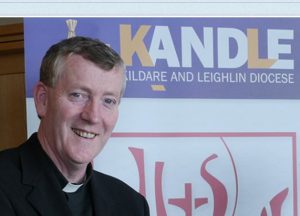
By Sarah Mac Donald - 07 August, 2018

Bishop Denis Nulty
The Bishop of Kildare & Leighlin has expressed concern over the great damage done by pornography to young people.
Speaking to CatholicIreland.net after the conference ‘Love and Life in Marriage – Celebrating the Church’s vision for sexuality and marriage on the 50th Anniversary of Humanae Vitae’, which took place on Saturday in Dublin, Bishop Denis Nulty warned that pornography damaged people and relationships and that the whole area of Relationships and Sexuality Education (RSE) had to be looked at.
“The greatest damage today is pornography; how do you equip young people to deal with things that they can get on their iphone, their tablet and they can pick up Wi-Fi anywhere and look at something and access something and not have the understanding … RSE in schools will have to be revised to give people a stronger way of going into life.”
He warned that getting into a sexual relationship far too early, before somebody is mature, could also do huge damage to a relationship.
“We have to try our best to educate our young people on the proper way of relating to each other,” Dr Nulty said.
Speaking about the conference theme, he said Humanae Vitae challenged people to understand what exactly the arrival of a child does to a couple and their relationship.
“It gives them the gift of being a parent; it gives them the gift of a new dimension in their relationship.”
He urged people to read the papal encyclical produced by Pope Paul VI in 1968.
“A lot of people haven’t read it but it is a short document. Fifty years later we still need to reflect on it. Amoris Laetitia is a continuation of Humanae Vitae. The documents of John Paul II in the theology of the body have the mindset of Humanae Vitae.”
He said people mustn’t be afraid to be a sign of contradiction in relation to the Church’s teachings in Humanae Vitae.
One of the conference speakers was Bishop Kevin Doran of Elphin. He told up to 150 people gathered for the event, which was hosted by the Nazareth Family Institute, that “There is much more at stake here than simply holding on to a doctrinal truth.
“In a world which has embraced abortion and is flirting more and more with euthanasia, it may seem almost foolish at this time to even suggest that we should attempt to regain the ground that has been lost and to propose once again a coherent and integrated view of human sexuality in which the unitive purpose of the sexual act is never separated from the openness to the act of giving life,” Bishop Doran said.
He stressed that Humanae Vitae teaches that every act of intercourse should be open in principle to the gift of life but “it is legitimate for married couples to make use of the natural cycle both to achieve pregnancy and to avoid it”.
He argued that the principles of Humanae Vitae have been ignored for too long and they need to be presented in a fresh way.
In Dr Doran’s opinion, “There is undoubtedly a place in schools for an appropriate presentation of the Church’s teaching on human sexuality and we have problems to address there, not least having a very good quality Catholic-inspired programme for relationships and sexuality education.”